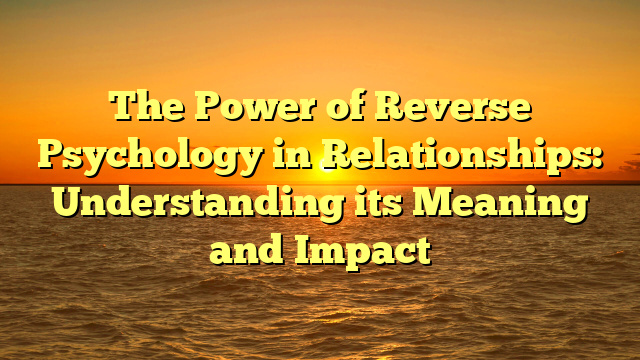The Power of Reverse Psychology in Relationships: Understanding its Meaning and Impact
The Power of Reverse Psychology in Relationships: Understanding its Meaning and Impact
Introduction
Reverse psychology is a technique that involves getting someone to do something by suggesting they do the opposite. It is a powerful tool that can be used in various situations, including relationships. In this article, we will explore the meaning of reverse psychology and its impact on relationships.
What is Reverse Psychology?
Reverse psychology is a technique that involves getting someone to do something by suggesting they do the opposite. For example, if you want your partner to clean the house, you might suggest that they don’t clean the house. This can create a sense of rebellion in your partner, making them more likely to clean the house to prove you wrong. Reverse psychology can be used in various situations, including parenting, sales, and relationships. In relationships, it can be used to get your partner to do something they might not want to do, such as trying a new restaurant or going on a vacation.
The Impact of Reverse Psychology on Relationships
Reverse psychology can have a significant impact on relationships. When used correctly, it can create a sense of excitement and adventure in the relationship. It can also help to break down barriers and encourage your partner to try new things. However, it is important to use reverse psychology carefully. If used incorrectly, it can create resentment and mistrust in the relationship. Your partner may feel manipulated and may not be willing to try new things in the future.
How to Use Reverse Psychology in Relationships
If you want to use reverse psychology in your relationship, there are a few things you should keep in mind. First, be subtle. You don’t want your partner to feel like they are being manipulated. Instead, try to make it seem like it was their idea to do something. Second, be positive. Instead of telling your partner what not to do, focus on what you want them to do. For example, instead of saying “Don’t stay home all weekend,” say “Let’s go out and do something fun this weekend.” Finally, be honest. Don’t use reverse psychology to manipulate your partner into doing something they don’t want to do. Instead, use it to encourage them to try new things and have fun in the relationship.
Examples of Reverse Psychology in Relationships
Here are a few examples of how you can use reverse psychology in your relationship: 1. If you want your partner to try a new restaurant, suggest that you don’t go there because it’s probably not very good. This can create a sense of curiosity in your partner, making them more likely to want to try the restaurant. 2. If you want your partner to go on a vacation with you, suggest that you don’t go because it’s probably too expensive. This can create a sense of rebellion in your partner, making them more likely to want to go on the vacation to prove you wrong. 3. If you want your partner to spend more time with you, suggest that you don’t need to spend as much time together because you’re both busy. This can create a sense of longing in your partner, making them more likely to want to spend more time with you.
Conclusion
Reverse psychology can be a powerful tool in relationships. When used correctly, it can create a sense of excitement and adventure in the relationship. However, it is important to use it carefully and honestly. By following the tips outlined in this article, you can use reverse psychology to encourage your partner to try new things and have fun in the relationship.

